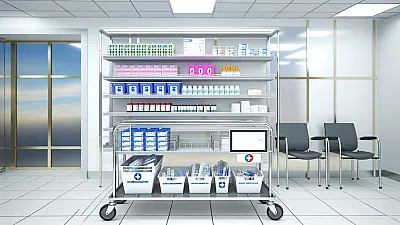Boonville Nursing Home Failed to Complete Wound Care Treatments for Resident with Heel Injury

BOONVILLE, IN - State health inspectors found that Transcendent Healthcare of Boonville repeatedly failed to provide prescribed wound care treatments for a resident's heel injury, with documentation showing missed treatments on at least 15 occasions between April and May 2025, according to an inspection report completed May 21, 2025.
Critical Gaps in Wound Care Documentation and Treatment
The inspection revealed a pattern of incomplete wound care for a resident with a right heel wound requiring daily treatment. Medical records showed that ordered wound care procedures, which included cleansing with wound cleanser, drying, and covering with bordered gauze dressing, were not completed on multiple dates throughout April and May 2025.
Between April 11 and April 19, staff failed to complete the prescribed daily wound care on three separate occasions. The situation continued when a new treatment order began on April 20, with seven additional missed treatments documented through May 20. The treatment protocol specifically required staff to "cleanse with wound cleanser, pat dry, cover with bordered gauze dressing, initial and date every day shift for wound care," yet documentation showed these critical steps were not performed on April 20, 21, 29, 30, and May 4, 12, and 18.
The facility also failed to properly monitor and maintain the wound dressing itself. A separate order required staff to check the placement of the dressing to the right heel every shift and replace it if not present. Records indicated this monitoring was not completed on eight occasions across day and night shifts between April 20 and May 18, 2025.
Medical Implications of Inconsistent Wound Management
Heel wounds require consistent, meticulous care to prevent serious complications. When wound care protocols are not followed consistently, several medical risks emerge. Heel pressure injuries are particularly vulnerable to infection due to their location and the constant pressure from positioning. Missing even a single day of prescribed wound care can allow bacteria to colonize the wound site, potentially leading to cellulitis or deeper tissue infections.
The bordered gauze dressings prescribed for this resident serve multiple critical functions. They maintain a moist wound environment essential for healing, protect the wound from external contamination, and absorb drainage that could otherwise macerate surrounding tissue. When these dressings are not changed according to schedule or when their placement goes unchecked for extended periods, the wound healing process can stall or reverse.
Furthermore, heel wounds face unique challenges due to reduced blood flow to the extremities, particularly in elderly residents who may have circulatory issues. This compromised circulation means that healing already proceeds more slowly than wounds in other locations, making adherence to treatment protocols even more critical.
Facility Response and Standard Protocols
When questioned about the incomplete treatments, the Director of Nursing acknowledged on May 21 that some treatment orders went uncompleted because the resident had received care from an outside source. However, the DON "could not provide a rationale for not providing all treatment orders," according to the inspection report.
A Licensed Practical Nurse interviewed during the inspection confirmed proper documentation standards, stating that "a resident's routine treatment orders should be documented as completed in the resident's record or if the treatment was not provided, a reason should be documented." This standard practice ensures continuity of care and allows all caregivers to track the progression of wound healing.
The facility's own policy, titled "Medication and Treatment Orders," specifically states that "orders for medications and treatments will be consistent with principles of safe and effective order writing." The repeated failures to complete or document wound care treatments represent a deviation from both the facility's internal policies and accepted medical standards.
Industry Standards for Wound Care Management
Professional wound care standards in long-term care facilities require systematic documentation and consistent treatment delivery. Best practices include designated wound care nurses or teams, standardized documentation forms that track wound measurements and characteristics, and clear communication protocols when treatments cannot be completed as ordered.
When external providers deliver wound care services, facilities must maintain coordination to ensure all prescribed treatments are completed. This typically involves documenting which treatments the external provider completed and ensuring facility staff complete any remaining orders. The absence of clear documentation about external provider involvement in this case created dangerous gaps in the resident's care continuity.
Proper wound management protocols also require regular reassessment of healing progress. Without consistent treatment and documentation, healthcare providers cannot accurately evaluate whether a wound is improving, stagnating, or deteriorating. This assessment is crucial for determining when treatment modifications are necessary.
Additional Issues Identified
The inspection report indicated this violation fell under Federal tag F0658, which addresses services that meet professional standards of quality. The facility was cited at a level of "minimal harm or potential for actual harm" affecting "few" residents. The investigation was initiated in response to complaint IN00458151.
Full Inspection Report
The details above represent a summary of key findings. View the complete inspection report for Transcendent Healthcare of Boonville from 2025-05-21 including all violations, facility responses, and corrective action plans.
💬 Join the Discussion
Comments are moderated. Please keep discussions respectful and relevant to nursing home care quality.